Flexible Barcodes Scanners for Multiple Applications
Flexible Barcodes Scanners for Multiple Applications
Blog Article
Why Barcode Scanners Are Important for Modern Retail and Warehousing
In the rapidly evolving landscape of retail and warehousing, the combination of barcode scanners has actually come to be a crucial component in simplifying procedures and boosting accuracy. As businesses strive for affordable benefit, comprehending the complex advantages of barcode modern technology exposes its important function in enhancing resource allotment and promoting robust provider relationships.
Benefits of Barcode Scanners
Barcode scanners supply countless benefits that substantially enhance functional performance in retail and warehousing environments. The automation of information entrance processes removes the errors commonly related to manual input, bring about enhanced accuracy in stock tracking and sales transactions. With the capacity to swiftly scan items, companies can expedite check out times, enhancing the client experience and decreasing delay times.
Moreover, barcode scanners facilitate real-time information collection, permitting prompt updates to inventory degrees and sales documents. This ability makes it possible for services to react immediately to changes sought after and enhance supply levels, minimizing excess inventory and lessening stockouts. Furthermore, the integration of barcode scanners with stock monitoring systems improves procedures such as order fulfillment and product returns, further improving functional effectiveness.
Price savings are one more vital benefit. By lowering labor expenses connected with hands-on supply administration and minimizing errors that can cause financial losses, barcode scanners add to overall success. In addition, their ease of use and portability make them obtainable for staff training, guaranteeing that employees can rapidly end up being proficient in their operation. Generally, the application of barcode scanners is a critical investment that generates considerable returns in effectiveness and operational excellence.
Enhancing Stock Management
Reliable inventory management is crucial for keeping functional effectiveness in retail and warehousing settings. Barcode scanners play a crucial role in this process by improving the tracking of stock degrees, product areas, and stock motions. By automating information capture, these devices minimize human mistake, leading to even more exact stock documents.
Using barcode scanners allows real-time presence into stock amounts, allowing services to make enlightened decisions regarding reordering and supply turning. This immediacy aids protect against overstocking or stockouts, both of which can adversely influence customer contentment and revenue margins.
Furthermore, barcode scanning helps with reliable supply audits. With fast scanning capabilities, personnel can carry out inventory checks swiftly, making certain that inconsistencies are determined and corrected promptly. Enhanced supply accuracy not just sustains operational efficiency yet additionally enhances partnerships with vendors, as accurate information can bring about better settlement terms and improved order gratification.

Improving Checkout Effectiveness
As consumers progressively demand quicker and a lot more reliable shopping experiences, enhancing check out procedures has actually come to be a leading concern for stores. Executing barcode scanners plays a critical function in this venture, substantially enhancing the purchase process. By allowing cashiers to check things swiftly, barcode modern technology minimizes the moment invested in each sale, therefore shortening overall wait times for customers.
Moreover, barcode scanners promote the accurate recognition of items, reducing the potential for mispricing and ensuring that consumers are charged appropriately. This efficiency not just enhances client complete satisfaction however likewise enhances the merchant's operational effectiveness. With the capacity to refine several things in quick sequence, stores can manage high quantities of purchases throughout peak shopping hours without sacrificing service top quality.
Additionally, incorporating barcode scanners with point-of-sale systems makes it possible for real-time inventory updates, supplying useful insights right into stock degrees. This immediacy allows merchants to manage inventory better, ensuring that prominent items continue to be in supply and decreasing the chance of shed sales. Generally, the adoption of barcode scanning modern technology is vital for improving checkout efficiency, inevitably causing improved customer experiences and raised sales for retailers.
Decreasing Human Mistake
In retail and warehousing environments, the application of scanning technology dramatically reduces human error throughout purchases. Standard hands-on access of product details is prone to errors, including incorrect prices, misidentified items, and data access mistakes. barcodes scanners. Barcode scanners enhance this process by automating the capture of product information, guaranteeing precision and consistency
By making use of barcode scanners, staff members can swiftly Resources check things instead than by hand inputting information. This automation minimizes the threat of human oversight, offering a more trustworthy purchase procedure. Researches reveal that errors in inventory monitoring can result in expensive discrepancies, influencing supply degrees and customer contentment. Barcode scanning alleviates these dangers by improving the accuracy of supply matters and sales records.
Additionally, barcode scanners boost accountability within the workforce. With clear data tracks created through scanning, discrepancies can be identified and resolved immediately, cultivating a culture of reference precision. barcodes scanners. The reduction of human error not just enhances functional effectiveness however additionally develops customer trust, as consumers get the appropriate items at the right prices. Overall, the adoption of barcode technology is an essential step toward attaining functional quality in retail and warehousing settings.
Future Patterns in Barcode Technology
The evolution of barcode technology is poised to transform retail and warehousing operations in the coming years, driven by developments in automation, information analytics, and mobile combination. As sectors significantly take on Internet of Points (IoT) systems, barcode scanning will come to be indispensable to real-time stock management and supply chain optimization. Boosted data analytics capabilities will make it possible for organizations to harness checked information for anticipating analytics, improving demand forecasting and stock turn over.

Furthermore, the combination his explanation of synthetic intelligence with barcode modern technology assures to streamline procedures with wise recognition and mistake discovery. As device discovering algorithms analyze checked information, they can offer insights that help avoid stockouts and overstock situations.

Final Thought
In conclusion, barcode scanners play a crucial function in contemporary retail and warehousing by boosting stock management, enhancing checkout performance, and significantly reducing human error. The integration of barcode innovation not just enhances procedures however likewise fosters far better vendor relationships and enhances source allowance. As technology remains to evolve, the future of barcode scanning guarantees further improvements that will certainly drive functional effectiveness and productivity in progressively open markets.
Report this page